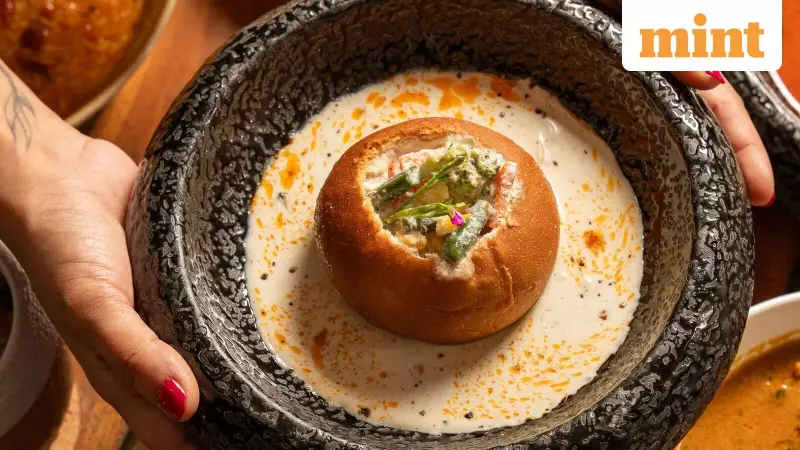
Delhi Embraces Hyperlocal South Indian Cuisine Revolution
The culinary landscape of Delhi is undergoing a remarkable transformation as a new wave of South Indian restaurants brings authentic, community-specific flavors to the Capital. From Syrian Christian kitchens to Bengaluru-style darshinis, food enthusiasts are witnessing an unprecedented flourish of regional specialties that go beyond the familiar idli and dosa.
The New Contenders: Benne and HOSA Lead the Charge
Recently, Benne, a darshini-style eatery that gained popularity in Mumbai last year, announced its Delhi outpost, creating massive excitement among food lovers eager to try its signature buttery benne dosa and authentic filter coffee. The social media announcement went viral, building anticipation for its December 2025 debut.
Meanwhile, HOSA, which first made its mark in Goa, has already opened at One Horizon Centre in Gurugram just before Diwali. The restaurant's arrival was teased for months through hoardings, creating such frenzy that professionals like Priyanjali Sinha skipped work to experience its opening day. "I've been to HOSA in Goa multiple times and was eagerly awaiting its opening in Gurugram," says Sinha, who particularly recommends the coconut ice cream with jasmine sorbet.
Beyond Traditional Staples: The Rise of Elevated Interpretations
While traditional South Indian staples have long been popular in Delhi, the current trend represents a significant shift toward contemporary, elevated interpretations coupled with renewed curiosity for hyperlocal cuisines. Chef-patron Ruchira Hoon of Draavin Canteen explains this phenomenon: "People are exploring cuisines from across the states, so now they are more aware of flavours and ingredients. We have been witnessing a regional cuisine boom in Delhi, so it was about time for south Indian cuisine to come into the limelight."
The trend gained momentum with ITC Hotels' Avartana, which opened in Delhi in October 2024 and set new standards for refined, sensorial dining. Draavin Canteen, with its innovative kari dosa and filter coffee soft serve, quickly captured attention when it opened in December 2024 at Amar Colony, later expanding to Gurugram's DLF Downtown 2 complex.
Other notable entrants include Mustard Madras (in Noida and Gurugram) and Kopparrai in Delhi, both becoming crowd favorites for their authentic takes on Andhra and Chettinad cuisines. Vellam in Gurugram has brought playful twists with innovations like dosa tacos and Kerala-style chicken wings.
Historical Context: Delhi's Long-standing South Indian Connection
Delhi's relationship with South Indian food dates back to the 1970s-80s with pioneering restaurants like Woodland's at The Lodhi Hotel and Dasaprakash at Ambassador. These establishments introduced the city to dosas, idlis, and home-style thalis, earning loyal followings despite being considered premium at the time.
The scene transformed significantly in 1986 when Jayaram Banan, known as the "dosa king of the north," opened the first Sagar outlet in Defence Colony market. The vegetarian South Indian restaurant became an instant success, eventually evolving into the Sagar Ratna chain with 51 outlets across NCR and presence in cities like Meerut, Karnal, and Dehradun.
About 15 years later, Banan expanded his vision with Swagath, introducing Delhi to coastal classics like masala crab. Around the same period, the Andhra Pradesh/Telangana Bhavan canteen became a go-to destination for its spicy mutton fry and prawn curry, offering affordable introductions to the region's fiery flavors.
Addressing the Gap: From Regional to Mainstream
While regional South Indian dishes have existed in Delhi for years, it wasn't until restaurants like Gunpowder opened in 2009 that these flavors received widespread attention. Later establishments like Toddy Shop (now closed) and Mahabelly in Saket continued this trend, with the latter remaining a favorite for Kerala coastal flavors.
According to Rohit Khattar, founder-chairman of EHV International (which owns HOSA), the timing is perfect for innovative concepts. He describes HOSA as offering "imaginative south Indian food" that balances adventure with approachability. The restaurant's signature Bun and Stew reimagines the classic Syrian-Christian breakfast, with chef Harish Rao elevating the coconut milk-based stew by serving it with a soft bun in a neat sphere, available in vegetarian and chicken versions.
Khattar emphasizes that while they've taken creative liberties, they haven't compromised on authentic flavors: "We are serving creative dishes that people typically don't expect at ₹1,500 for a meal." The menu includes specialties like Elaneer Pepper Fry, Dindigul Mutton Biryani, and Raw Banana Paniyaram, alongside Goa favorites like Curry Leaf Pesto Snapper and Roti Canai.
The Future: Experimentation Meets Authenticity
Restaurateurs are increasingly viewing Delhi as a market ready for culinary experimentation. Akhil Iyer, co-founder of Benne along with Shriya Narayan, decided to bring the concept to Delhi despite advice to expand within Mumbai first. "There is room for menus centred around one or two hero dishes," Iyer says. "I am waiting to see if south Delhi, known for its upscale restaurants, will embrace this fast, affordable and communal way of enjoying food."
While technology and operational efficiency shape modern restaurant businesses, chefs remain committed to their core vision. Benne aims to maintain the neighborhood darshini experience through centralized kitchen operations and tech integration for seamless ordering.
However, authenticity remains non-negotiable for many chefs. As Ruchira Hoon firmly states: "I've had people ask for paneer Chettinad, and I won't compromise for demand." This commitment to genuine flavors while embracing innovation demonstrates how Delhi's South Indian culinary landscape is evolving—proving the city is both adventurous and discerning, eager to explore diverse flavors while respecting tradition.





